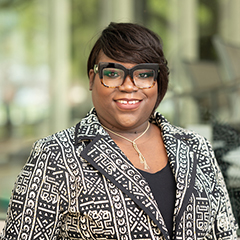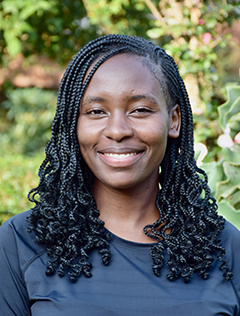 As we enter the final weeks of the submissions period for our 2025 30 Under 30 list, we are taking a look back and reconnecting with some of the inspiring individuals from around the globe who have been recognized on our previous lists. These young visionaries were celebrated for their extraordinary contributions to literacy, and we are thrilled to share their journeys since joining the 30 Under 30 ranks.
As we enter the final weeks of the submissions period for our 2025 30 Under 30 list, we are taking a look back and reconnecting with some of the inspiring individuals from around the globe who have been recognized on our previous lists. These young visionaries were celebrated for their extraordinary contributions to literacy, and we are thrilled to share their journeys since joining the 30 Under 30 ranks.
In this four-part series, we are sharing Q&As with past honorees that offer a look into their personal and professional journey. We are exploring how being named to the ILA 30 Under 30 list impacted their careers, the paths they have taken in the years since, and the valuable lessons they have learned along the way.
Through these conversations, we aim to not only celebrate their successes but also to gather their insights and advice for other emerging literacy leaders. If you know someone who belongs on our 2025 list, then submit a nomination today.
 Shontoria Walker (2019)
Shontoria Walker (2019)
Executive Director, Education PowerED
Texas, U.S.
How did receiving the 30 Under 30 honor from ILA impact you both personally and professionally?
Receiving the 30 Under 30 honor was a transformative experience for me both personally and professionally. On a personal level, it was an affirmation of my dedication and hard work in the field of literacy education. This recognition validated my commitment to using culturally relevant pedagogy to influence literacy achievement among middle school Black male students. It reinforced my belief that the work I am doing is not only necessary but also impactful.
Professionally, this honor significantly boosted my visibility and credibility within the educational community. It provided me with numerous opportunities to connect with other leaders in literacy education, expanding my network and fostering collaborations that have enriched my work. The recognition also attracted attention to my nonprofit, Education PowerED, where I serve as executive director, allowing us to broaden our reach and amplify our mission of promoting educational equity.
Can you share some highlights of your professional journey since being recognized by ILA?
Since receiving the honor from ILA, my professional journey has been marked by several significant milestones. One of the most noteworthy highlights has been the successful launch and growth of Education PowerED. Our nonprofit organization is dedicated to championing educational equity by empowering educators to create transformative learning environments where all students can thrive.
Another highlight is the publication of my coauthored book, Culture to the Max! Culturally Responsive Teaching and Practice, published by Wiley Publishing and Jossey Bass books, which has received positive feedback from educators and administrators nationwide. The book provides a comprehensive framework for implementing culturally responsive teaching and has been instrumental in shaping classroom practices to counter institutionalized racism and white supremacy.
Furthermore, being featured in prominent publications such as USA Today and Authority Magazine has helped to raise awareness about the importance of culturally responsive teaching and the work we are doing at Education PowerED.
What projects or initiatives have you been involved in since receiving the 30 Under 30 honor?
Since receiving the honor, I have been deeply involved in several impactful projects and initiatives through Education PowerED. One of our flagship programs is the EmpowerED Educator fellowship, a three-month program designed for BIPOC early career educators. This fellowship provides a hands-on, deep-study experience in implementing culturally responsive practices, incorporating AI-fueled professional learning, mentorship, and reflective practice.
Additionally, we have been actively contributing to educational research and developing instructional resources that support culturally responsive teaching. Our collaborative spaces foster a community where educators can grow, collaborate, and champion equity for all students. These initiatives have been instrumental in advancing our mission and vision of creating transformative learning environments and driving positive change in education.
What advice would you give to current educators or literacy advocates who aspire to make a difference in the field?
Build strong relationships with your students, colleagues, and community, as these connections are crucial for fostering a supportive and collaborative educational environment. Advocate for policy changes that support educational equity and be a vocal champion for the rights of all students to receive a high-quality education. Remember, your efforts can make a profound impact, so remain steadfast in your pursuit of equity in literacy education.
How do you see the future of literacy education evolving, and what role do you hope to play in that?
The future of literacy education is evolving toward greater inclusivity and cultural responsiveness. As we continue to recognize and address the diverse needs of students, it is essential that literacy education evolves to reflect and honor these differences. I envision a future where culturally responsive teaching is the norm, and every student has the opportunity to succeed in a literacy-rich environment. I hope to continue playing a significant role in this evolution by leading initiatives that promote culturally responsive teaching and advocating for educational policies that support equity and inclusion.
 Kellyn Sirach (2016)
Kellyn Sirach (2016)
Reading Content Specialist, Illinois SLD Support Project
Illinois, U.S.
How did receiving the 30 Under 30 honor from ILA impact you both personally and professionally?
Being recognized with the 30 Under 30 honor by ILA ignited a desire to continuously expand my knowledge and dedication to my students. This honor fueled my commitment to further my education, leading me to pursue a master’s degree and undergo additional training to support teaching reading for students with learning disabilities.
Looking back, how has the recognition from ILA motivated you to continue your efforts in advancing literacy, and what future goals do you have in this regard?
As a young educator, I frequently grappled with feelings of inadequacy stemming from my age and lack of experience. However, being honored by ILA served as a powerful affirmation. It reinforced the notion that age is no barrier to making significant contributions to student well-being and literacy development.
Can you share some highlights of your professional journey since being recognized by ILA?
Since being honored by ILA, my professional journey has been marked by many enriching experiences. In 2022, I was appointed as an Illinois Teach Plus Policy Fellow, dedicating my literacy advocacy efforts to shaping literacy policy within the state. I contributed as a member of the draft writing team for the Illinois Comprehensive Literacy Plan and currently serve as the cochair of the Illinois State Board of Education Dyslexia Handbook.
What projects or initiatives have you been involved in since receiving the 30 Under 30 honor?
I have been actively engaged in several impactful projects and initiatives in regard to literacy. Notably, I, along with several other educators at Teach Plus IL, played a pivotal role in advocating for the passage of the Literacy and Justice for All Act in Illinois.
How do you continue to stay inspired and motivated in your work in literacy?
Connecting with the individuals I work with—whether they are students, educators, or members of the community—fuels my motivation. Witnessing the impact of literacy on their lives, seeing students grow as readers and writers, reinforces my sense of purpose in this work.
What advice would you give to current educators or literacy advocates who aspire to make a difference in the field?
To all educators and champions of literacy: Amplify your voices. Advocating for our students’ literacy skills is not just crucial—it’s essential.
 Monicah Kyalo (2023)
Monicah Kyalo (2023)
Technology Assistant and Program Mentor, Kenya Connect
Wamunyu, Kenya
How did receiving the 30 Under 30 honor from ILA impact you both personally and professionally?
Receiving the 30 Under 30 honor profoundly impacted my personal and professional life. It was heartwarming to see my work and efforts with LitClubs, library programs, and the Expanding Horizons Club being recognized internationally. Personally, the award has been a source of immense pride and motivation.
Professionally, the award has opened up numerous opportunities for growth and development. Through ILA, I have had access to a wealth of resources, including free workshops, online materials, newsletters, and magazines. The resources have enhanced my teaching skills and introduced me to many new read-aloud strategies.
Furthermore, the honor has enhanced my professional network, connecting me with other educators and literacy advocates worldwide. This network has provided invaluable support, collaboration, and exchange of ideas. Being recognized as an honoree has also given me an advantage when applying for fellowships and other professional opportunities, allowing me to further my impact on the students with whom I work.
Can you share some highlights of your professional journey since being recognized by ILA?
One of the key highlights has been the transformative impact of incorporating read-aloud sessions in my teaching. Through online sessions provided by ILA, I learned more effective strategies for using books during my sessions. I have learned how reading aloud can introduce and reinforce concepts from diverse fields such as science, history, and social studies, making learning more interdisciplinary and comprehensive.
Another highlight has been mastering the art of selecting books. I learned that children have the right to read widely and exposing them to books by and about people who are different from themselves helps them develop a better understanding of the world. This has helped students develop their global competency skills.
Incorporating storytelling into my classroom has also been a major highlight. Initially, I found it challenging to use storytelling effectively. However, through ILA’s resources, I discovered that storytelling is a powerful tool for enhancing literacy and engagement.
What projects or initiatives have you been involved in since receiving the 30 Under 30 honor?
I have been actively engaged in several meaningful initiatives aimed at improving the literacy of the students within the Kenya Connect partner schools. I have conducted professional development sessions for my colleagues during our monthly social activities. These workshops focused on advanced read-aloud strategies, how we can use photos to capture student’s attention and make lessons more stimulating, and various student grouping methods to facilitate collaborative learning. Through sharing my acquired knowledge with my colleagues, they have been equipped with new techniques to enhance their classroom teaching and interaction with students.
In addition, I have been working on improving student assessments, particularly through read-aloud sessions. It always brings me joy when I see students reading a book aloud to their peers. This has largely boosted their confidence and provided me with more information on their different reading abilities. I have been able to identify students struggling with pronunciation, fluency, and comprehension. This has provided a perfect opportunity to provide further insight. I am continually learning and implementing formative assessment tools to support students’ decoding, phonics knowledge, fluency, and comprehension.
How do you continue to stay inspired and motivated in your work in literacy?
When a student who used to struggle with reading starts reading fluently and confidently and enjoys it, this inspires me. When a student who could not speak in class starts to speak, starts to ask and answer questions, starts expressing themselves without fear, that inspires me. When a student shares a story they read from a book they checked out or borrowed from a friend, that motivates me. The growth and progress of students is always rewarding.
As Nelson Mandela said: “Education is the most powerful weapon which you can use to change the world.” Literacy is a fundamental skill that opens doors to opportunities and empowers individuals to succeed in life. Knowing my work contributes to this greater purpose is a powerful motivator.
What advice would you give to current educators or literacy advocates who aspire to make a difference in the field?
To all educators and literacy advocates, stay passionate about your goal to improve literacy, and be persistent when faced with challenges. This will inspire your students and keep you motivated. Stay committed to your mission of improving literacy and remember that every effort, no matter how small, contributes to making a significant impact.